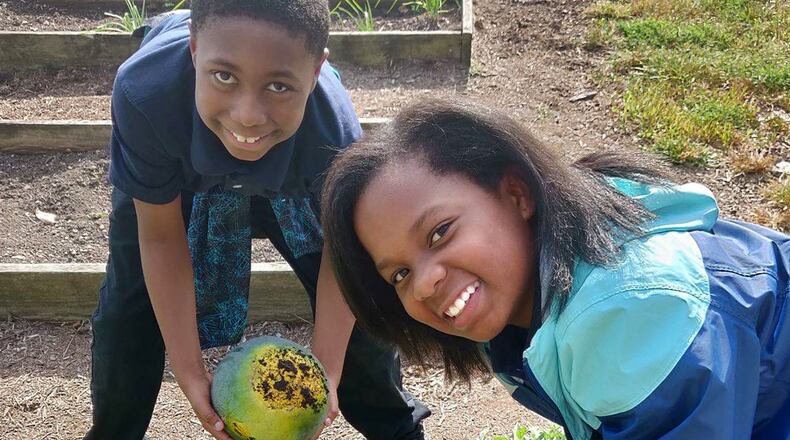“Research shows people who spend time outdoors are often happier and healthier, so Five Rivers MetroParks wants people to visit our parks and participate in our programs,” said Amy Dingle, MetroParks director of outdoor connections. “Realistically, however, people may not be worried about spending time outdoors if they are hungry. Even if they do get outside but aren’t receiving proper nourishment, they may not be able to fully capitalize on nature’s health and wellness benefits.”
This is one reason why Five Rivers MetroParks is working with community partners to help address Dayton’s challenges with hunger.
Fresh from the Farm
Fresh produce is a running theme throughout MetroParks, especially at such locations as the 2nd Street Market and Cox Arboretum and Possum Creek MetroParks. Many of MetroParks’ public programs explore cooking, gardening, farming and sustainability practices. MetroParks’ staff and volunteers are acutely aware of the Dayton area’s hunger-related issues because they often work with local organizations to promote healthy eating, smaller local farms and community gardening.
“It’s so important to meet people where they are,” said Kaitlyn Lowry, education coordinator for community gardens and farm programming. “MetroParks is a community asset and because we care about the community’s health, we have to make our resources available.”
Five Rivers MetroParks addresses hunger in the community in its gardens.
More than a ton of produce donated to the Foodbank annually is grown in the Edible Landscape Garden at Cox Arboretum MetroPark and the Demonstration Garden at Possum Creek MetroPark. Potatoes, greens, tomatoes, squash and peppers are just some of the veggies gleaned throughout the growing season. During the 2019 growing season 1,760 pounds of produce was donated to the Foodbank from Possum Creek MetroPark alone.
In addition to using its greenspace for good, MetroParks runs a community gardening program that teaches people how to start and sustain a community garden and provides support to existing gardens. Some of those gardens, in turn, donate all their produce to those in need.
“MetroParks is a vehicle that can provide guidance and resources when available,” Lowry said. “But it’s really the community gardeners that are empowered to grow themselves and their communities. They have the ability to provide greater food security in the Dayton region.”
Partners in Produce
Geography also plays a role in food insecurity, which is something 2nd Street Market Manager Lynda Suda talks about often.
“We’re so proud to be located downtown, but that also gives us a lot of responsibility,” said Suda. “We are one of the only locations where people can shop for fresh food in the downtown area. Additionally, there are food deserts just a short distance away, so we have to take food equity and accessibility very, very seriously.”
With a goal to make the Market a more inclusive shopping space, MetroParks developed a partnership with local nonprofit Homefull to provide better access to fresh food.
Homefull clients work at the Market selling produce grown at the organization’s urban farms. These client-employees also run the Market’s EBT/SNAP exchange, where people who use these benefits receive tokens to shop at participating Market vendors. Customers also can use Produce Perks, a dollar-for-dollar match — up to $20 per visit — for every dollar spent on produce.
The partnership provides Homefull clients with meaningful employment skills and the Market’s vendors reach a broader clientele.
Suda serves on Montgomery County’s Food Equity Coalition and Thriving Local Economy work group. This group is creating a local food hub to connect local farmers with retail locations where fresh produce is needed most — food deserts.
In these areas, it’s difficult to find affordable, high-quality food. Food deserts are prevalent in the Dayton region, especially in the primarily African American neighborhoods in west Dayton. According to Dayton & Montgomery County Public Health, 35.5% of west Dayton residents live in poverty.
Learning to Love Healthy Eating
Adventure Central (AC) it is helping students in west Dayton nourish their minds and bodies. Located at Wesleyan MetroPark, AC is a free youth development program that provides meals, educational programming and homework assistance to 95 youth during the school year and 140 campers during the summer.
AC serves 600 meals a week to its students, but its kitchen was designed to serve snacks. The Five Rivers MetroParks Foundation is raising funds to renovate the AC kitchen so it has more space, storage, updated kitchen amenities and more.
“The kids use their minds in our kitchen,” said AC director, Nate Arnette. “They grow skills, learn about healthy eating habits and really understand how important access to fresh food is for the community.”
While food insecurity in the Dayton region is a considerable challenge, MetroParks looks forward to continuing to be a part of the solution.
“I’m encouraged by all the organizations, partners and volunteers working to develop new ways to alleviate hunger in our region,” Suda said. “We’re all in this together.”
To learn more about starting a the 2nd Street Market or how to start a community garden, visit metroparks.org. To make a contribution to the Five Rivers MetroParks Foundation's AC kitchen fundraiser, visit metroparks.org/kitchen.
About the Author



